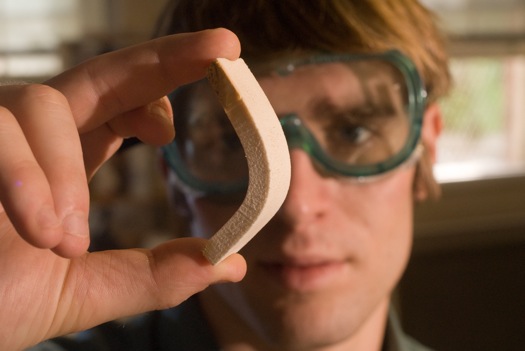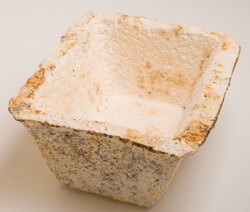A (very cool) fungus grows in Troy

Eben Bayer with a piece of Greensulate.
OK, so you've probably heard all about locavorism and the effort to buy locally-sourced, but what about taking that philosophy and applying it to industrialism?
That's exactly what RPI grads Eben Bayer and Gavin McIntyre are trying to do with their company Ecovative Design.
Bayer and McIntyre have been getting international attention for a process they created that uses mushrooms to create biodegradable insulation. After winning a series of grants and prizes, they've now officially launched their business with a product called Greensulate.
 Here's how it's created, more or less: Spores from mushroom specimens are mixed with water, grains and a mineral mixture called perlite and put in a mold. The spores then grow root-like cellular strands throughout the mixture, forming a "sheet" that can be dried and hardened into rigid boards or other shapes. The resulting material is a lot like Styrofoam, only it's organic and natural and isn't going to sit in landfills and survive the nuclear holocaust along with cockroaches and Twinkies. Oh, and it doesn't require the use of potentially harmful chemicals in its construction, nor does it release harmful byproducts. It's also cheap to make.
Here's how it's created, more or less: Spores from mushroom specimens are mixed with water, grains and a mineral mixture called perlite and put in a mold. The spores then grow root-like cellular strands throughout the mixture, forming a "sheet" that can be dried and hardened into rigid boards or other shapes. The resulting material is a lot like Styrofoam, only it's organic and natural and isn't going to sit in landfills and survive the nuclear holocaust along with cockroaches and Twinkies. Oh, and it doesn't require the use of potentially harmful chemicals in its construction, nor does it release harmful byproducts. It's also cheap to make.
Bayer grew up on a farm in Vermont, learning about mushrooms and other vegetation. So when tasked with coming up with a sustainable building material, he thought the fungus might work. And so far, it has.
As students, some of Bayer and McIntyre's specimens were grown in decidedly non-scientific places -- like under their beds. But the two have now scored themselves a spot in RPI's business incubator. That's where they -- along with others such as Stanford grad Ed Browka -- are experimenting with their product to construct packing materials, organic biodegradable planters, and much more. They're also on the lookout into local woods for new fungi with which to experiment.
They take great pride in using local products to construct Greensulate whenever possible. For products used in New York, they've been using native grains like winter rye and buckwheat, and they've also been experimenting with a product for the Texas market that could be made with grains indigenous to the Lone Star state.
Ecovative Designs is currently working with a couple of different businesses to try to bring their product to market. And last month the team won $750,000 in the 2008 PICNIC Green Challenge, an international competition challenging entrepreneurs to reduce carbon dioxide emissions with new consumer products or services.
Photos: Ecovative Design LLC
Hi there. Comments have been closed for this item. Still have something to say? Contact us.
Comments
Did these guys have an article about them in Discover magazine by any chance? I think I remember reading about them. Or perhaps I had a psychic vision about this post. Or maybe I just hit my head. Yeah, I probably just hit my head. Freaking banana peels get me every time.
... said Pantaloons on Nov 24, 2008 at 11:49 AM | link
Pants, I believe you're right.
... said jess on Nov 24, 2008 at 12:42 PM | link